By CLARISSA SAY and NATASHA VENNER PACK
alltherage@thestar.com.my
IT was nighttime when we parked our cars and stepped out apprehensively onto a vacant street in Kapar, Klang.
To our left was a stretch of mostly untenanted shop-lots; to our right, a fenced-up scrap yard housing stacks of shipping containers. Dogs barked in the distance and a gaunt face looked out from behind a gate as our group of performers lit their candles. The performers for the night were Joy Victor, Evelyn Feroza, and brothers Jared and Michael Lim from indie band Jumero.
Here was the plan: R.AGE senior producer Elroi Yee would walk down the street and knock on the door of Mariyammah, a mother who works tirelessly to support her husband and seven children.
As far as the family was concerned, he was there to do an interview. Five minutes later the rest of us were to show up outside the door – with our carolling candles the only source of light we had, save for the occasional passing motorbike – and surprise Mariyammah with music, gifts and food.
But there was a problem. In the dark, the performers and our R.AGE crew had lost sight of Yee, and were now staring uneasily down a hauntingly dark street.
What we didn’t realise was that we were right in front of Mariyammah’s house, a small shack made of corrugated tin and wooden boards, hidden between two large trees. Blink, and you’d miss it.

Mariyammah’s house is kept upright by an assemblage of boards and nails and when it rains, it leaks.
The tungsten lights indoors were dim and barely visible from the street but they are a precious luxury to Mariyammah and her family, who can barely afford their electricity bill. Their shack doesn’t have running water either.
Mariyammah earns RM900 a month making festive lights in a factory. The same festive lights hang in an uncomplicated line inside her home, but the lights aren’t there to celebrate the holiday season – they’re just there.
“All work is difficult,” she told us matter-of-factly. “There is no easy work these days.”
Mariyammah is the sole breadwinner in her family. Because of this, she cannot apply for the Department of Social Welfare’s (JKM) single mothers’ scheme. It was only until Nov 25 last year, when Selangor raised its poverty line to RM1,500 per household, that she became eligible for financial assistance from JKM. The poverty line for the rest of Peninsular Malaysia remains at RM760.
So technically, in the eyes of the Federal Government, Mariyammah is not “poor”.
The government has published reports showing a decreasing amount of absolute poverty. However this is not a good reflection of the actual figures but rather a glossing over of the prevalence of poverty despite the growth of the country. The urban poor are described as those living in urban areas below the poverty line, which is fixed at RM760 in peninsula Malaysia and RM1,050 and RM910 in Sabah and Sarawak respectively.
The 2014 annual report released by the Performance and Management Delivery Unit (Pemandu) stated that only 1% of Malaysians are living in poverty thanks to their Economic Transformation Programme (ETP). This figure is backed up by the Economic Planning Unit (EPU), whose which reported in 2014 report on the percentage distribution of households according to income class saidthat only 1% of Malaysian households earn under RM1,000, compared to 3.1% in 2012.
While it seems like poverty is decreasing, But most of these this figures are based on absolute poverty, which is not a fair reflection of matters as it does not take into account relative poverty, according to the United Nations Development Programme’s (UNDP) 2013 Malaysia Human Development Report.
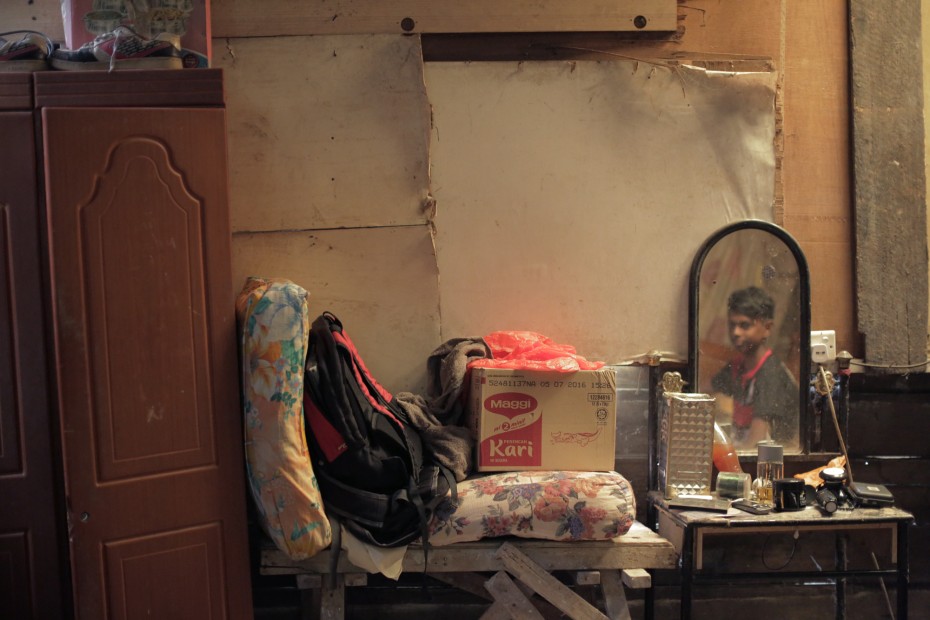
The bedroom of Mariyammah’s youngest son, Kanages. Expelled from school without warning, he is now doing odd jobs at construction sites. He hopes to be allowed back to school when the new school term begins in January. ― Photo by: ELROI YEE/The Star
Relative poverty is based on what household income, where those considered poor earn 50% below the national median income; for example if the median is RM2,000, those in poverty would earn RM1,000. As the wealth of the country develops, the cost of the average standard of living increases and this affects relative poverty. The relative poverty line is based on national median income, which is a more helpful yardstick as it measures poverty against the country’s average cost and standard of living.
According to the same UNDP report, Malaysia’s relative poverty line should have been RM1,813 per household for in Malaysia.
Selangor has been the only state to start using a relative poverty line, which is almost double the current national poverty line, as published on Dec 1 by The Star. Based on the new standard, 1.5 million out of five million Selangor residents are classified as poor.
And Selangor isn’t even a state that has a high incidence of poverty, according to an EPU report, which measured its poverty rate at 0.2% compared to Sabah and Labuan’s 3.9%. If we were to use this to calculate the percentage of Malaysians living in poverty – putting Malaysia’s population at 30 million – Selangor alone accounts for 0.05% of urban poor.
It’s not even a state that has a high incidence of poverty according to the EPU’s report on the Incidence of Poverty by Ethnic Group, Strata and State 1974 – 2015. It has a puny 0.2 as compared to Sabah and W.P Labuan’s 3.9. If the rest of the country was to change their relative poverty lines to better reflect the current situation, would the statistics remain the same?
Singing for a cause
Standing outside Mariyammah’s house, the performers began singing in harmony to a closed door. Another second passed before one of Mariyammah’s children peeked out; it was a girl with wide eyes and curly hair. Behind her stood another, taller girl. Mariyammah’s children immediately peeked out through the door, with a mix of wonder and confusion on their faces while listening to the cheerful holiday songs – and we hadn’t even given them the food and gifts yet!
“I was sad, but happy,” said Jared, the elder Lim brother. “They were living just opposite this row of houses, but no one really sees them.
Also with us were Joyce Thong from Malaysian Care, and Pastor Mageson Muniandy and his wife Elizabeth Maria Dass, who have been giving provisions to families like Mariyammah’s. Thong watched on quietly from the sidelines.
“It’s so easy not to notice them because of an ingrained individualism,” said Thong. “We’ve been taught to mind our own business. The working poor aren’t the majority, so it’s really easy for them to blend into the background and we just don’t see them.
“They aren’t begging from us, they aren’t going around telling people how they feel, or what they’re going through.”
And it’s not just Mariyammah’s family that’s going through this. Over five days last week, R.AGE visited four other urban poor families, bringing along performing artistes like Bihzhu, Russell Curtis, Chelsia Ng and Sean Chong to do what Jumero and Co. did.
All the families live in plain sight, in urban areas less than an hour away from Kuala Lumpur and Petaling Jaya, but are yet unseen by most.
Russell visited a mother of five whose family was surviving on RM600 a month, which she earns by working two jobs, 12 hours a day, seven days a week. R.AGE brought the children the meal they had wished for – pizza and fried chicken – and surprised the mother with a new saree.
“Honestly, in the grand scheme of things, we didn’t do much,” said Russell, who was visibly moved by the experience. “(Helping them) is not as simple as giving them a meal. What happens tomorrow? Efforts need to be made to make the next generation better.”
The reality of the situation hit home particularly hard for him, as some of the children in the family were the same age as his two sons. After the visit, Russell set out to help the family by writing a song about the experience, which he will release soon.
“Those children have all the problems in the world but they don’t act like it!” said Russell. “They had the best spirit. Not a care in the world – I wish I could be like them!”
Bihzhu, Ng and Chong gave a Christmas surprise to a Christian Pakistani family seeking asylum in Malaysia. While the family was away, we set up a Christmas tree in their makeshift home with gifts for the children, as the father had told us when we first met that he wanted to celebrate the holiday just as his family did back home.
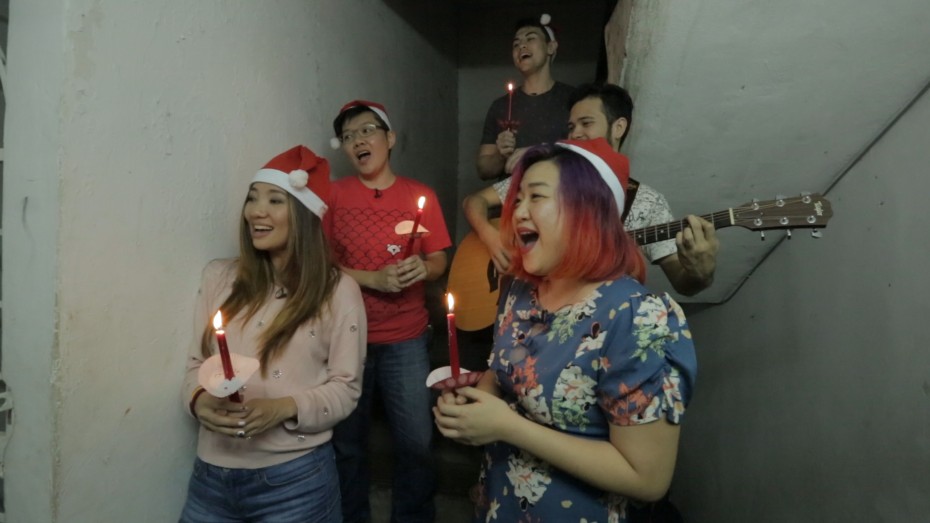
Singers Chelsia Ng (left) and Bihzhu (right) giving a surprise performance to a Christian Pakistani family seeking asylum in Malaysia.
Mariyammah’s isn’t the only story like this. Across the span of five days, R.AGE visited four other houses, joined later on by other singers such as Bihzhu, Sean Chong and Chelsea Ng.
The families all lived in plain sight, but unseen to the public eye, holed up in unimaginably small shophouses and terrace houses, similar to the ones we walked past earlier. “I’ve always heard about squatter homes, but I’ve never actually been inside one,” said Jared.
“It’s like when I see something on the news so often I become desensitised, and then I’m stepping into their house and now it has become so personal for me.”
There’s barely any space inside Mariyammah’s home. Some of our crew had to wait outside and watch as Joy showed Mariyammah’s children how to play on their new guitar on a cramped sofa – a gift from the R.AGE team.
“What struck me the most was how Mariyammah never once complained about anything (during our visit),” said Joy. Instead, Mariyammah insisted that all she wanted for Christmas was to see her children happy.
“All I could think of was how to instill some sort of hope in the kids that there is a way out,” said Joy.
According to Thong, the visit and accompanying R.AGE video campaign is just a small step towards inclusion and acknowledgment of the working poor.
“On a personal level, we can all keep our eyes open for the marginalised in our social circles,” she said. “It may be a quiet boy in our class, or a colleague who never joins for lunch.
There are things we can all do.
“Small things like just being a friend, starting a conversation, or buying them lunch. Some of them might not be forthcoming at first. They’re like us; they don’t want to be seen as beggars, they don’t want their troubles broadcasted. They’re just trying to get by.”
Thanks to people like Thong, Mageson and Elizabeth, Mariyammah’s family is getting by.
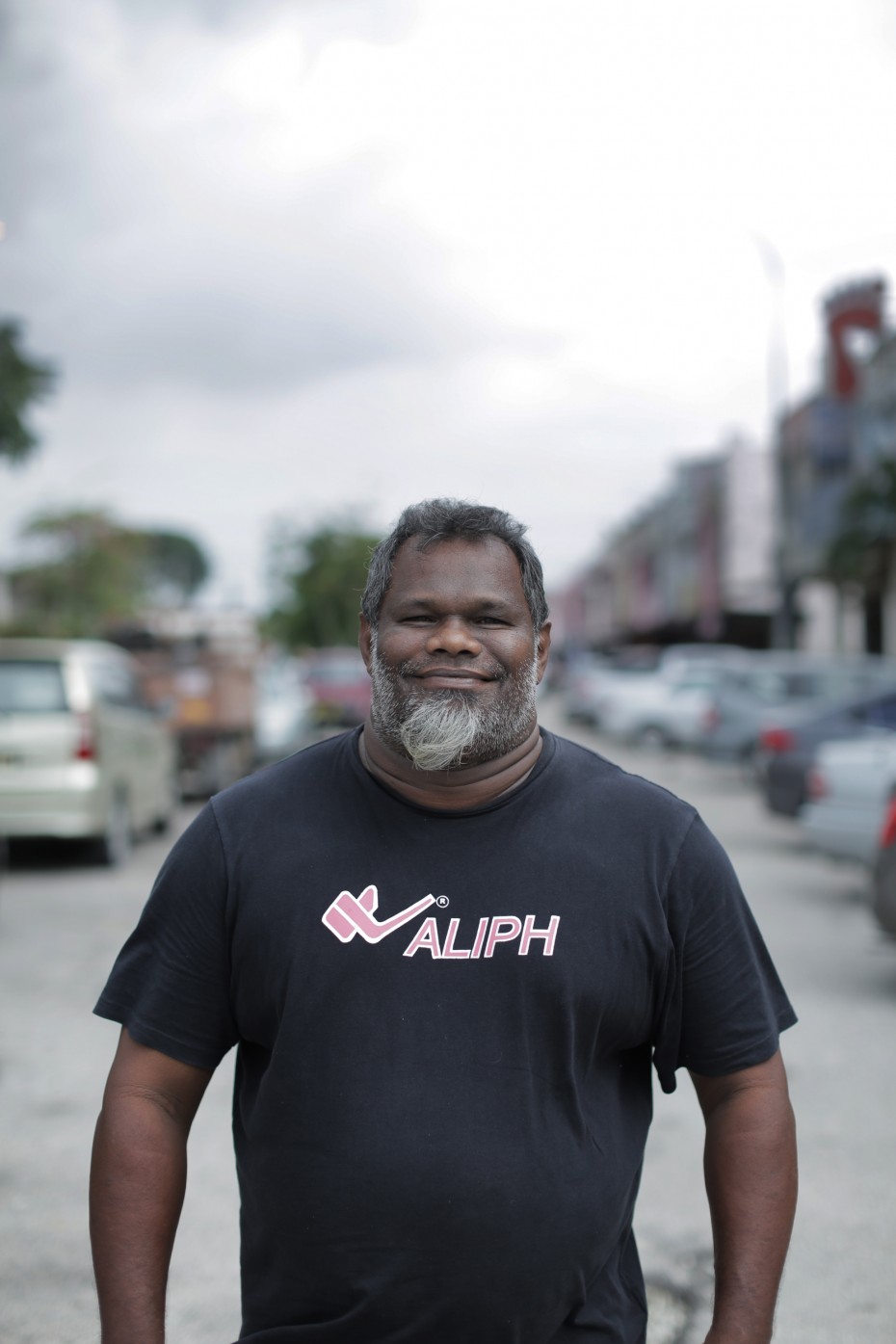
Without Pastor Mageson’s monthly provisions and financial aid, Mariyammah and her family wouldn’t be able to survive.
“It just doesn’t make sense that some of us are living luxuriously while others are starving,” said Thong. “But that’s life.”
According to Thong, being born into privilege means we benefit indirectly from the working poor – Mariyammah’s low wages translate into more affordable Christmas lights for us. Which is why it’s so important to give back to the community. Those savings were never ours to begin with.

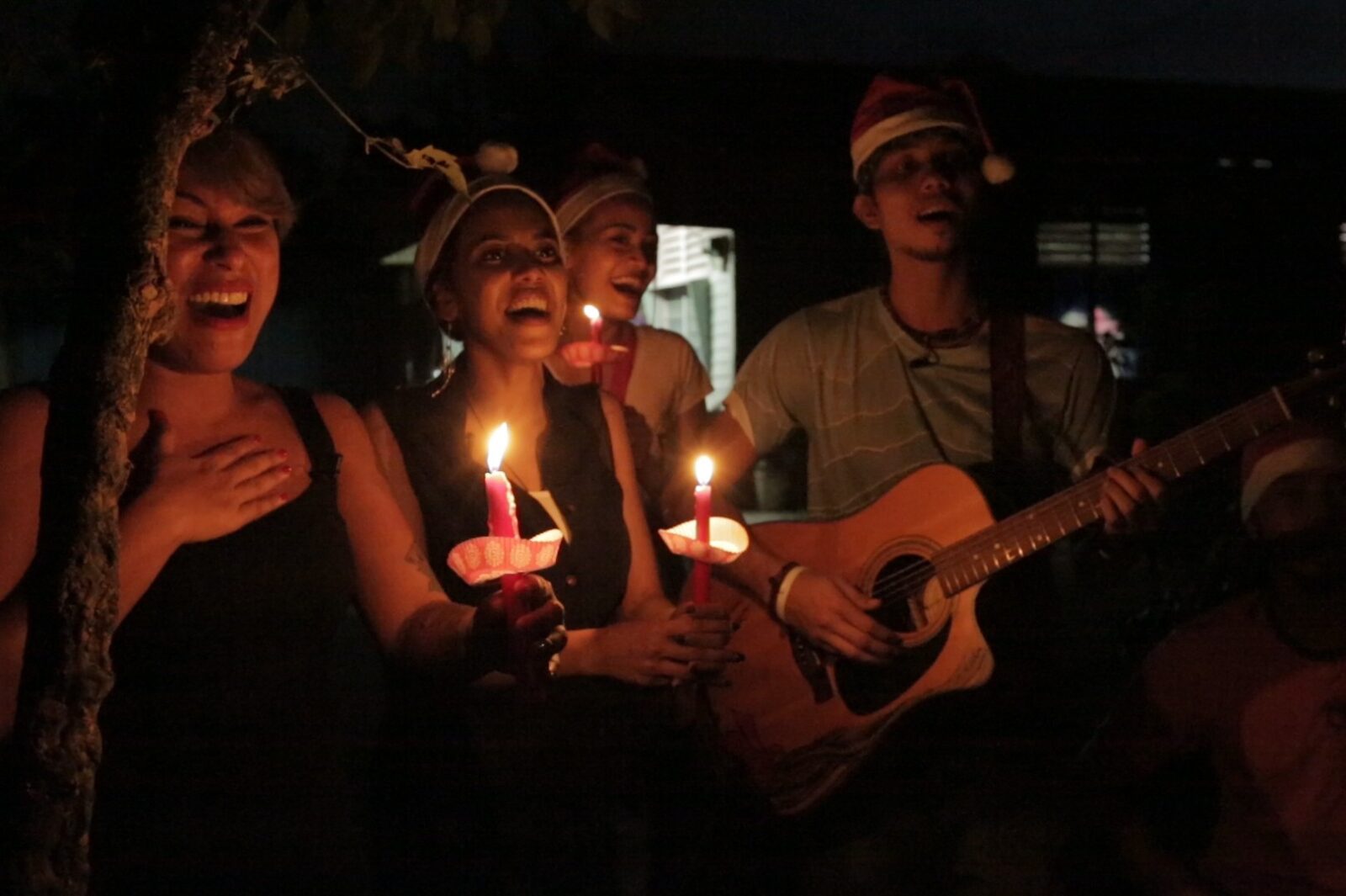
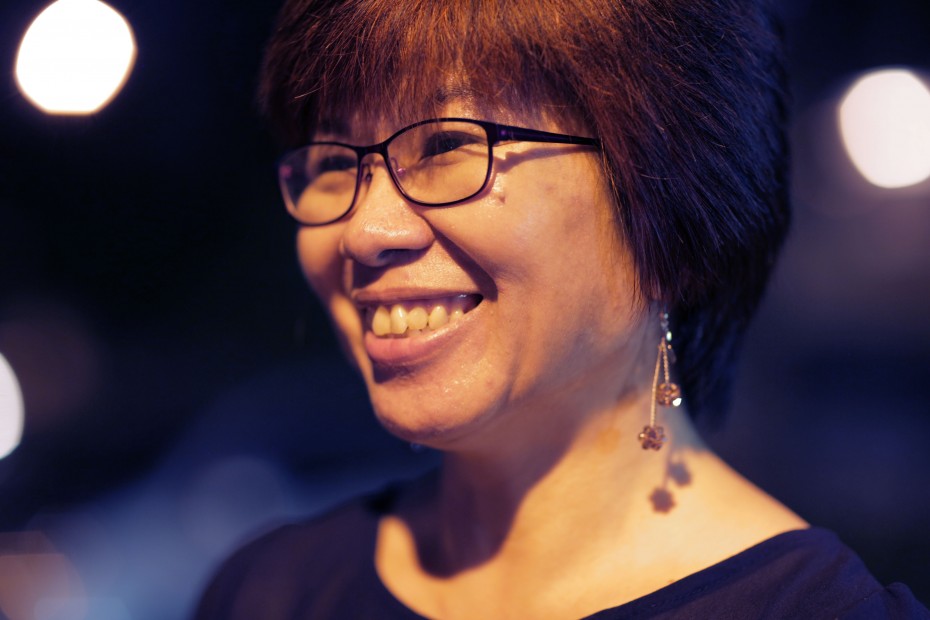
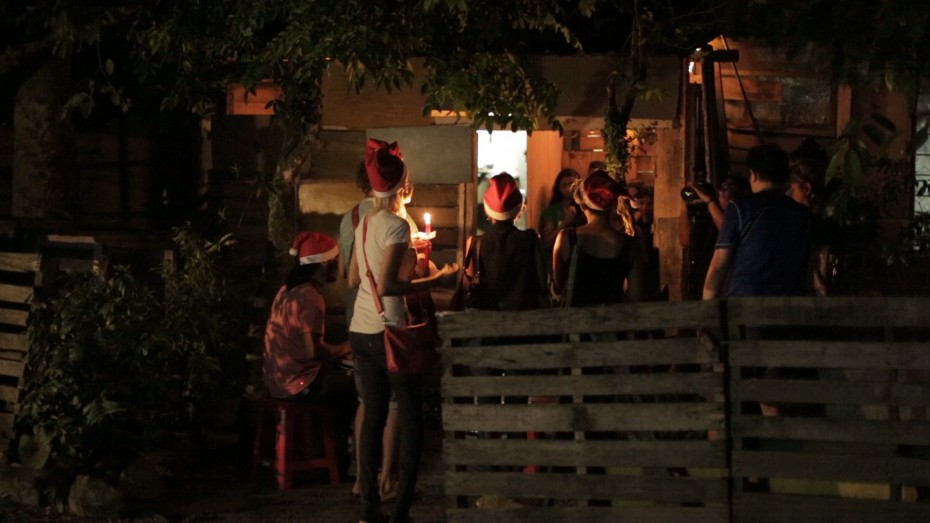

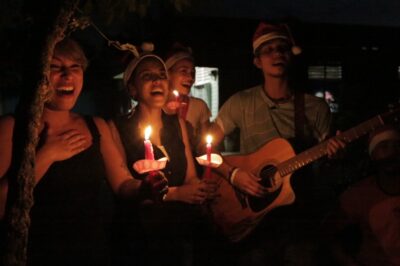

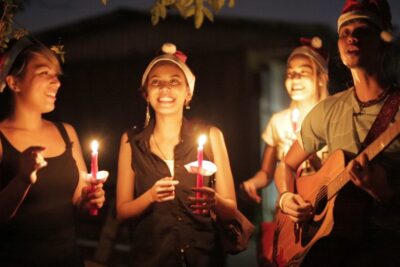
Leave a reply